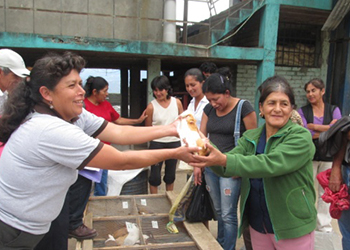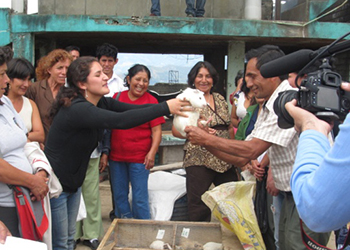
Story by Luis Gómez | North Project Coordinator | Heifer Peru
Photos courtesy of Heifer Peru
La Prosperidad de Chirinos coffee cooperative held a Passing on the Gift® (POG) ceremony in Cajamarca, Peru, on World Food Day 2012. Thirty coffee producer families who received guinea pigs from Heifer Peru in the spring gave 210 guinea pigs to new project families during the October 16 event.
Most economic activities in this region revolve around coffee production; however, the crop's vulnerability and market fluctuations make it difficult for families to maintain a steady income and food security throughout the year. Guinea pig breeding can supplement families' incomes and decrease fluctuation.
Coffee producers in this region are monocroppers, meaning they only grow one crop. Therefore, they depend heavily on the income from coffee sales. Income potential is limited by yield level, number of cultivated areas and the international market price. For a fixed period of the year, families obtain higher incomes from the coffee harvest, allowing them to buy food and school supplies for their children, as well as reinvest in their plots. Surplus earnings, when available, are spent on personal necessities. Monocropping can be a bitter cycle that places farming families in a vulnerable situation. Moreover, the instability of their production is worsening as global climatic change affects environmental conditions.
Heifer Peru designed a strategy to help these families gain economic stability through the project Healthy Life and Sustainable Production for Coffee Producer Families in Lambayeque and Cajamarca – Peru (COOPCAFE). The project's objective is to improve the quality of life for 1,057 coffee-producer families from Asociación Unión de Cafetaleros Ecológicos (UNICAFEC), Solidaridad Chirinos de Cajamarca and the coffee producers association ASPAPE. This project emphasizes the importance of food as a right and highlights the need for healthy food. Furthermore, empowerment of female coffee producers and strengthening their organizations are fundamental tenets of the project.
The project provided sheep, guinea pigs, bees, seeds, veterinary kits, spray irrigation kits and materials for healthy homes. The diversification of farms using clean technologies is not only a fundamental necessity to improve coffee production, but it ensures food for their families. The project aims to achieve diversification of income during most of the year, making participants less vulnerable to climatic change and market fluctuations. "Farm diversification helps us have a very competitive market at home,” project participant Oswaldo Calvo said.
 The celebration was a public event attended by 132 people, including leaders, local authorities and coffee producers. During the celebration, participants, encouraged by the cultural and artistic acts, shared their emotions, feelings and hopes of a gift given from one family to another. “We did not only receive guinea pigs, but also workshops, and we recognize this as a valuable contribution of our basic food basket,” said Luisa Cruz.
The celebration was a public event attended by 132 people, including leaders, local authorities and coffee producers. During the celebration, participants, encouraged by the cultural and artistic acts, shared their emotions, feelings and hopes of a gift given from one family to another. “We did not only receive guinea pigs, but also workshops, and we recognize this as a valuable contribution of our basic food basket,” said Luisa Cruz.
Not only does the POG enhance food safety, it also is the manifestation of values such as solidarity and cooperation to overcome vulnerability. It maintains the full exercise of mutual help, while supporting even more families. Passing on the Gift® made the celebration of World Food Day a reality in this remote area of the coffee cooperative La Prosperidad.
Find out how you can help families around the world.